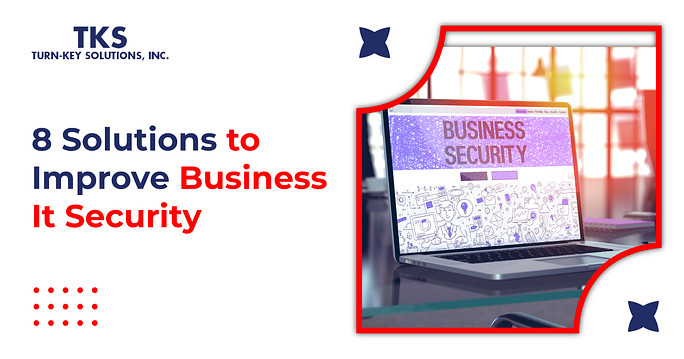As a business leader, you are directly aware of security issues. Your information system is likely to be threatened by various attacks, damaging the integrity of your data and that of your customers. Perhaps you feel overwhelmed by the scope and number of actions to be implemented, or are you actively preparing for an upcoming security audit? This blog gives eight tips to strengthen IT security for businesses at a low cost.
Physically Protect Your Infrastructure
The physical security of your computer equipment (hardware) has a double challenge. It is a question both of sustaining expensive equipment, which could be damaged in the event of a disaster or of a local or remote attack, and of protecting the content of your PCs, servers, and other storage equipment. The physical security of your information system requires the use of leak or fire detectors. Moving sensitive equipment (racks and servers) to dedicated, locked rooms to restrict access to authorized persons is also recommended.
Protect Internet Access
Business IT security begins with protection from the outside. Your Internet connection must always be secure, especially if you have generalized the use of Wifi to make life easier for your employees. The web is a gateway for hackers and malicious software (malware).
Use a WPA or WPA2 key, which is a reliable security protocol. If your employees use your company’s connection to surf the web with their own equipment (Smartphones), their devices must have a sufficient level of security. If necessary, you can prohibit the use of external and unrecognized devices as a precautionary principle.
Protect the Computer Network
Many threats can affect the integrity of your networks: viruses, malware, ransomware, hackers, etc. Fortunately, different security solutions help businesses protect themselves properly. A firewall must imperatively be installed and functioning on all workstations, including mobile ones, as well as a powerful antivirus adapted to the professional environment. Care must be taken to frequently install updates to this software to keep it effective.
Backup Your Computer Data
Business IT security also takes into account the restoration of data in the event of a disaster or attack. Protecting your data is a necessity: it is both your work base and the history of your company. Set up automatic backups and a restore system to limit the deleterious effects of data loss or theft. Your collaborators will be able to save the essential files on external hard drives, which will be kept in specific spaces. Disaster Recovery Plans should be carefully considered.
If the servers are physically installed on your premises, a backup server capable of taking over in the event of a malfunction must be installed. Companies that use cloud computing should always check the level of security and redundancy offered by their service provider.
Encrypt Data
The encryption or encryption of data consists in making them unreadable to users who do not have access to them. Encryption is essential in case of theft, corruption, or identity theft. It should be associated with complex passwords for increased security.
Filter Emails
The use of an anti-spam filter makes it possible to guard against social engineering, a practice that consists in imitating a trusted interlocutor to recover information and resources from the company. To reinforce the integrated anti-spam of your messaging software, you can use dedicated filters such as Symantec Messaging Gateway or Symantec Microsoft Exchange Online Protection.
Educate Users
You must evangelize all of your employees to make them aware of computer security issues. An informed user is worth two. In the event of a malfunction, suspicious email, or compromise of the workstation, each member of your team must know how to act and how to avoid risky practices (use of personal passwords, lack of locking of workstations, involuntary dissemination company files).
Anticipate Incidents and Minimize Their Impact
The best way to avoid incidents is to have an IT security policy in place and stick to it. Since it is impossible to achieve risk 0, you must anticipate security breaches, both on the material and human levels. The implementation of a Disaster Recovery Plan (DRP) notably makes it possible to minimize financial or operational damage after an attack.
Business Computer Security: Conclusion
Securing his information system is within reach of any manager, at least to avoid the most classic pitfalls. However, many companies have not yet implemented basic measures such as installing antivirus software or backing up their data.
Turn-Key Solutions (TKS) provides its clients with the best IT services in Alabama, like data backup solutions and document management services.

